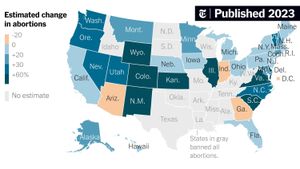The FBI’s early morning raid on the Manhattan home of Polymarket CEO Shayne Coplan has sparked controversy and prompted accusations of political persecution against the outgoing Biden administration. Executed on Wednesday, the search was part of what federal authorities described as law enforcement activity concerning potential violations by Polymarket, which operates as a betting platform for predictions on various events, including political races and outcomes.
Coplan, 26, reportedly woke at around 6 AM to find federal agents at his door. According to reports from the New York Post, they demanded his electronic devices, including his phone, leading to the seizure of these items as part of the investigation.
Polymarket has drawn attention for its prediction markets, especially during the 2024 presidential election, where it gave considerable odds favoring Donald Trump as the likely victor against Vice President Kamala Harris, even when many mainstream polls showed the race to be closely contested. This discrepancy has led some experts to question whether the platform's odds accurately reflected public sentiment or if market manipulation was at play.
After settling with the Commodity Futures Trading Commission (CFTC) for nearly $1.4 million and ceasing operations for U.S. users back in 2022, the legality of Polymarket’s operations remained murky. Some users still managed to access the site through VPNs, which the company maintained was against their policies. Following recent court decisions, Coplan expressed hopes for bringing Polymarket back to U.S. soil.
Coplan defended Polymarket's position, asserting the platform maintains non-partisan values and has provided significant value to users during the election by offering straightforward betting mechanics on outcomes of interest. Despite its previous legal troubles, Coplan claims the platform operates transparently, helping users to understand significant events through betting.
On social media, Coplan called the raid "discouraging," insinuated it was retaliation for Polymarket's favorable odds on Trump, and characterized it as politically motivated. He stated, "We are deeply committed to being non-partisan...the incumbents should do some self-reflecting," directing tacit critiques toward Biden's administration.
The tech community has also rallied to Coplan's defense. Brian Armstrong, the CEO of Coinbase, expressed outrage, questioning the motivations behind the raid and asserting it would backfire on the Biden administration. Tesla's Elon Musk echoed similar sentiments on X, formerly Twitter, voicing his disapproval with the raid.
While the specifics of the investigation remain undisclosed, analysts suggest the legal inquiry could focus on the platform's adherence to regulations governing betting and prediction markets. With the FBI remaining tight-lipped about the particulars, both the marketplace and Coplan's future hang uncertainly as political dynamics shift with the new administration on the horizon.
Polymarket isn't just another betting platform—it's intertwined with the controversial world of political betting, where its predictions have often been compared to political polling. Many wonder if the site has enabled the exploitation of betting to influence political narratives.
This raid stands as a significant moment repeatedly echoed by various figures—could it signal growing tensions between technology platforms and governmental oversight, or could it genuinely be viewed as political retribution, as Coplan claimed? Whatever the reasons, the fallout from this incident is likely to have significant ramifications for the burgeoning prediction market space.
Overall, the FBI's actions have put Polymarket—and the broader issue of election betting—under the microscope, raising questions about the intersections of politics, legality, investment strategies, and public sentiment. The precise legal standings of platforms like Polymarket, especially as they navigate between appropriate regulatory frameworks and the world of sports and political betting, remain to be fully determined as legislative and regulatory bodies begin to address these increasingly popular practices.
Shayne Coplan's bold assertion about the current administration's motives resonates as more than mere rhetoric; it encapsulates the broader unease felt by entrepreneurs and tech executives who fear overreach by government agencies motivated by perceived political affiliations.
This search and seizure incident may have set the stage for future battles over digital markets and the role they play within our democracy, reshaping everything from user experience to legislative responses. How this will play out remains to be seen, but it’s bound to be closely monitored as new developments arise.



